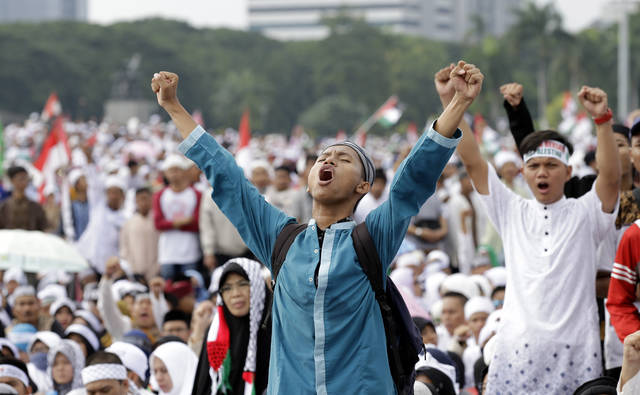JAKARTA, Indonesia — Muslim clerics called for a boycott of American products Sunday in Indonesia’s largest protest against President Donald Trump’s recognition of Jerusalem as Israel’s capital.
Wearing white robes and carrying banners reading “Indonesia unites for Palestine” and “Save our Palestine,” an estimated 80,000 people rallied in the capital of the world’s largest Muslim nation in the 10th straight day of protests.
Anwar Abbas, a top cleric from the Indonesian Council of Ulema, read a petition calling on Indonesians to stop buying American products until Trump revoked his move.
“Don’t rely on their products,” he said, as the crowd including men, women and children responded by waving Indonesian and Palestinian flags and shouting “boycott!”
Previous anti-American protests have unsuccessfully lobbied for a boycott of U.S. goods.
Jakarta police spokesman Argo Yuwono said the protesters marched peacefully about 3 kilometers (1.8 miles) from the National Monument Park to the U.S. Embassy. Some local media reported the number of the demonstrators was double the police estimate.
About 20,000 security forces were deployed to secure the rally.
In the petition, the clerics urged Trump to immediately revoke his recognition of Jerusalem as Israel’s capital because it has hurt international justice, violated human rights of the Palestinians and undermined peace efforts.
It also demanded nations not follow the U.S. in moving their embassies from Tel Aviv to Jerusalem and urged the U.N. Security Council to hold an emergency session to discuss Trump’s declaration.
The chairman of the clerics council, Ma’ruf Amin, said “let’s fight together with the government and the world for the freedom of Palestine through political, diplomatic and economic ways.”
Indonesian President Joko “Jokowi” Widodo has strongly condemned Trump’s move as a violation of U.N. resolutions.
Indonesia does not have diplomatic ties with Israel and has long been a strong supporter of Palestinian aspirations for a statehood.
Trump’s announcement overturned decades of U.S. policy, and a longstanding international consensus, that the fate of Jerusalem be decided as a part of a peace deal between Israel and Palestinians. Israeli and Palestinian claims to the city’s eastern sector form the core of their conflict, and Trump’s announcement was seen as siding with the Israelis.


